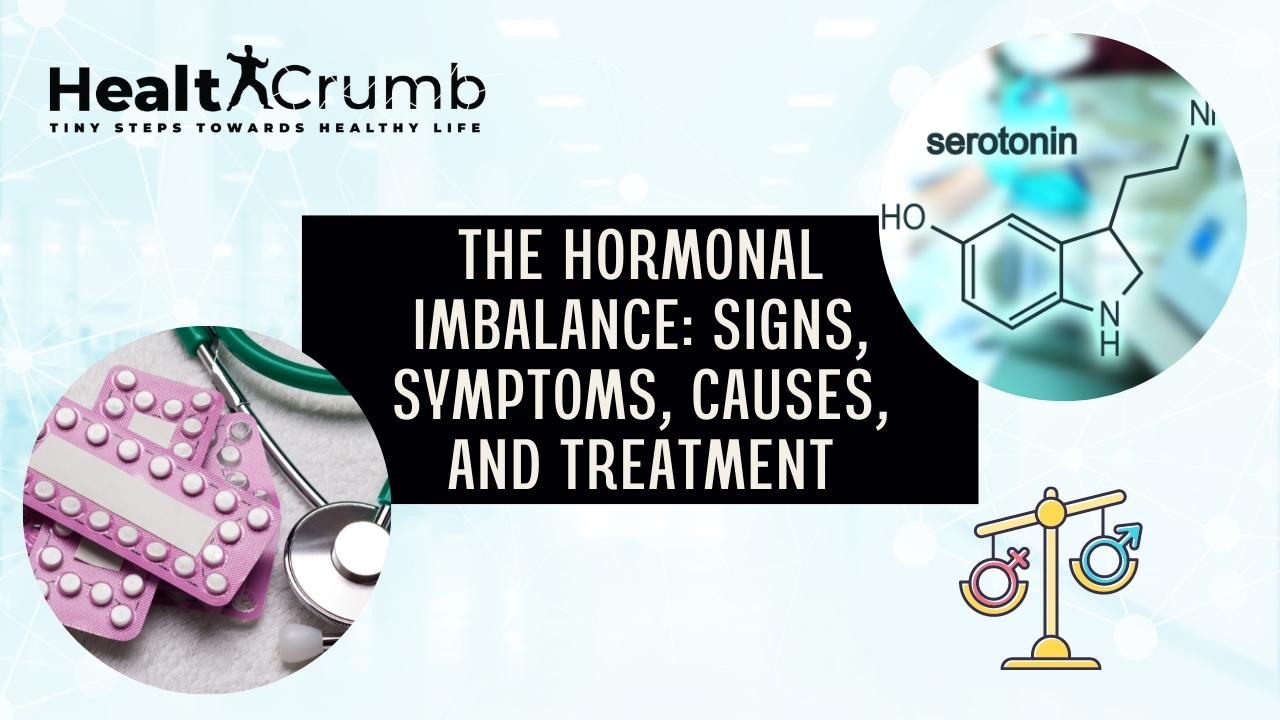There are many factors that can lead to hormonal imbalance, including diet, stress, genetics, and lifestyle.
In this article, we’ll discuss the signs and symptoms of hormonal imbalance, as well as the causes and treatments of this condition. By learning about these factors and how to address them, you can help yourself to ensure that your body operates at its best!
What is a hormonal imbalance?
A hormonal imbalance is when your body’s natural hormones are not working properly. This can lead to a number of health problems, including weight gain, mood swings, and decreased libido.
There are various factors that can contribute to a hormonal problem, including age, lifestyle choices, and genetics. If you think you may have one, it’s important to talk to your doctor about it.
There are three main types of hormones:
- Endocrine system hormones: These are chemicals that are produced by the body’s glands (endocrine system) and travel through the bloodstream to other parts of the body. They play a role in many important physiological processes, including growth and development, metabolism, and reproduction.
- Gonadal steroids: These are chemicals that are made by the gonads (the sex organs). They act as hormones in the body, regulating activities like growth and sexual function.
- Hormone-binding proteins: These proteins control how much each type of hormone is available to interact with other molecules in the body.
Hormones are powerful signals. For many hormones, having even too much or too little of them can cause major changes to your body and lead to certain conditions that require hormonal disruption treatment.
Some hormonal problems are temporary while others are long-term (chronic). Additionally, once you find out what symptoms can cause you hormonal imbalance, you’ll require treatment to stay physically healthy, while others may not impact your health but can affect your life quality.
Signs and symptoms of a hormonal imbalance
If you are feeling out of balance, there are a few things that may be going on. Here are some signs and symptoms of hormonal imbalance:
- Weight gain: People with a hormonal imbalance tend to gain weight in areas that don’t usually pack on the pounds (like the belly), and they often have difficulty losing weight even after making significant changes to their diet and exercise habits.
- Mood swings: If you’re prone to mood swings, you may experience them more frequently and severely when you have a hormonal illness.
- Decreased libido: One of the hallmark signs of a hormonal imbalance is decreased libido. This can be due to low levels of estrogen or testosterone, either alone or in combination.
- Infertility: If you’re struggling to conceive, your doctor may suspect a hormonal imbalance if your ovaries don’t respond normally to fertility tests.
Some common signs and symptoms of hormonal imbalance includes:
- Fatigue, trouble sleeping, and mood swings.
- Persistent acne or other skin problems.
- Weight gain or weight loss without changing your diet or exercise habits.
- Irregular periods, infertility, and low libido.
- Increased anxiety or depression.
- Trouble concentrating or remembering names or faces.
If you are experiencing any of these symptoms, it is important to see a doctor to rule out any underlying conditions that may be causing the imbalance and to start treatment if necessary.
Causes of a hormonal imbalance
A hormonal imbalance is when your body doesn’t produce enough of one or more hormones. This can cause a variety of causes. The causes of hormonal disruptions can vary, but often include lifestyle choices (such as smoking, drinking, and overeating), stress, and genetics.
Some factors that can contribute to hormonal imbalance include:
- Age – As we age, our natural hormones start to decline, which can lead to an imbalance in our hormones. This can cause a number of issues, including increased risk for heart disease, cancer, and osteoporosis.
- Weight – Having a high weight percentage increases your risk for hormonal imbalances. In addition to increasing your risk for chronic health conditions, being overweight also leads to an increased production of hormones that can contribute to an imbalance.
- Menstruation – Hormonal changes during menstruation, such as ovulation, can cause an imbalance in the hormones that are responsible for regulating mood, appetite, and energy levels.
- Pregnancy – During pregnancy, the body produces a number of hormones that help to ensure the development of the fetus. If you’re pregnant, and you have a hormonal imbalance, it can lead to complications for both you and your baby.
- Over-the-counter medications – Certain over-the-counter medications, such as ibuprofen, can interfere with your body’s natural hormone production. This can cause an imbalance in your hormones, which can lead to a number of issues.
- Birth control pills: Some types of birth control pills can affect the way your body produces hormones, leading to an imbalance.
- Hormonal surgery such as hysterectomy and oophorectomy can also lead to an imbalance.
- Autoimmune diseases conditions like Hashimoto’s thyroiditis can cause an imbalance in hormones.
- Endocrine cancers – Cancer that arises from cells in the endocrine system, such as breast or ovarian cancer, can also lead to an imbalance in hormones.
- Hormone replacement therapy (HRT) – HRT is a treatment for hormonal imbalance that includes taking synthetic versions of estrogen and progesterone. HRT can be used to treat symptoms of a hormonal imbalance, but it can also be prescribed to prevent them.
If you’re experiencing any of the symptoms listed above, and you think you may have a hormonal imbalance, it’s important to consult your doctor for an accurate diagnosis.
Treatment Options
It is likely that you have a hormonal imbalance: weight gain, mood swings, fatigue, difficulty sleeping, and irregular menstrual cycles. While there is no one-size-fits-all solution to restoring balance, there are a number of ways to address the issue. Here are some tips for treating a hormonal imbalance:
1. Consult a healthcare professional: A hormonal imbalance can be difficult to self-diagnose, and seeking help from a healthcare professional can help ensure that you are taking the appropriate steps to address the issue.
2. Treat any underlying health conditions: If you have an underlying health condition that is causing your hormonal imbalance, working to resolve that condition will also help to restore balance.
3. Balance your diet: Eating a balanced die helps to improve your overall well-being and maintain your hormonal balance. Make sure to include plenty of antioxidant-rich fruits and vegetables, nuts and seeds, and whole grains in your diet.
4. Take supplements or medications as directed by your healthcare professional: If supplements or medications are necessary to restore balance, be sure to follow the directions carefully. If you are unable to lose weight or experience other symptoms of a hormonal imbalance through diet and exercise, taking supplements may be an option for you. Many types of supplements are available that can help to restore balance in your hormones. Speak with your healthcare professional about which supplements may be best for you.
5. Use natural remedies if available: Some people find relief from their symptoms by using natural remedies such as herbs or supplements. If you are considering using natural remedies, be sure to speak with a healthcare professional first to ensure that the remedy is appropriate for your specific situation.
6. Hormones Therapy: Hormones therapy is a treatment option that can help to restore balance in your hormones. Hormones therapy is often prescribed to women who have difficulty regulating their own hormones, such as those who have polycystic ovary syndrome (PCOS). Hormones therapy can also be used to treat other conditions related to hormone imbalance, such as infertility. Speak with your healthcare professional about whether hormones therapy is right for you.
7. Reduce stress levels: Stress can have a negative impact on hormones, and reducing your level of stress can help to restore balance. Try relaxation techniques, exercise, or meditation to reduce your stress levels.
8. Exercise: Exercise can help to improve your overall well-being and maintain your hormonal balance. Moderate exercise is best for maintaining balance, but even a small amount of exercise can be beneficial.
There’s not one specific test that can diagnose a hormonal imbalance, but your doctor will likely perform a variety of tests to determine the extent of the problem. These may include blood tests, hormone levels, and metabolic tests.
If you think you may have a hormonal imbalance, it’s important to talk to your doctor. There are a variety of treatments available that can help restore balance and improve your health.
Conclusion
Hormonal imbalance is a common problem that can have a negative impact on our overall health. By understanding the signs and symptoms of this condition, as well as the causes and treatments, you can help to restore balance in your body.
Remember to consult your doctor if you are experiencing any of the following symptoms: weight gain, mood swings, fatigue, difficulty sleeping, and irregular menstrual cycles. Additionally, reduce stress levels by engaging in relaxation techniques, exercise, or meditation. If necessary, take supplements or medications to restore balance in your hormones. If you’re unable to resolve the issue through diet and exercise or by using natural remedies, hormone therapy may be an option for you.



